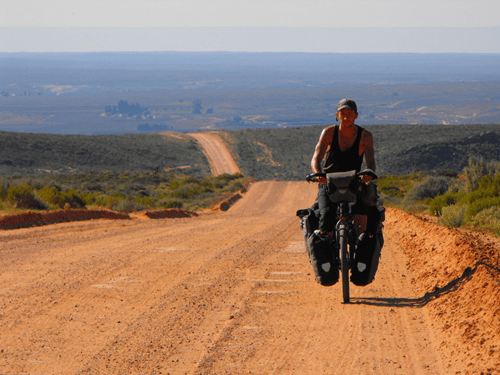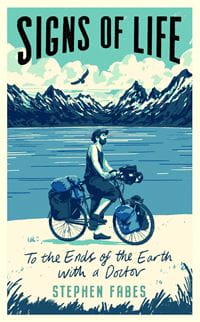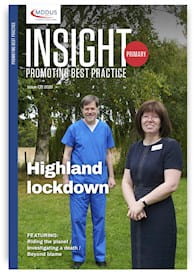 AT THE age of 29, having just completed his MRCP, Stephen Fabes decided to turn his life upside down. He was going to cycle the length of six continents, all but Antarctica, all by himself, however long it took.
AT THE age of 29, having just completed his MRCP, Stephen Fabes decided to turn his life upside down. He was going to cycle the length of six continents, all but Antarctica, all by himself, however long it took.
“I was at the end of my 20s and I was longing for an adventure,” explains Stephen. “It was as simple as that. I was keen to get a sense of the scale and diversity of the world and I have a slightly obsessive streak which meant that I wanted to do it all in one go.”
In his teens he and his brother spent six months cycling the length of Chile, so he had some understanding of what was involved. Other than that, it was a leap in the dark.
“I’d been reading books by cyclists like Alastair Humphreys and other adventurers, but what inspired it more than anything was the experience of Chile with my younger brother. We were really out of our depth.”
His memoir of what turned out to be a six-year quest, Signs of Life, is a rollicking ride around the planet as he navigates all the hurdles it could throw at him, from bad weather and precipitous mountain tracks, to officious authority figures and insects of all shapes and sizes.
There’s a lot of humour and self-deprecation in the telling, much thoughtful and interesting reflection on what it means to be a lone adventurer in distant lands, and, throughout, his doctor’s-eye view of those lands adds yet another layer of insight. Also there is a huge cast of characters, from the deaf girl in Albania who passes him notes over dinner – “Are you shameful?”/ “Are you happy?”/ “Princess Diana: accident or murder?” – to Paul, the American teacher on the run from his Amish background and living in western Kazakhstan.
LIQUID LAUNCH
But first, day 1: “I’d been cycling around the world for 20 minutes or so when a pub called The George appeared on my left,” he writes. “Pre-homesick”, he had a few drinks and ended that first day’s cycle in Bexleyheath, a mere 14 miles from the start line of St Thomas’ Hospital, where he had just quit his job in A&E.
It was an inauspicious beginning. It was also midwinter – the coldest winter in Europe for 31 years – and there was a lot of pushing of his bike through pedal-deep snow in the early days. There were aches and pains too – he wasn’t especially fit – and by the time he reached Turkey an MRI of his knee revealed a problem requiring surgery. To add insult to injury, the Eyjafjallajökull volcano in Iceland had just erupted and all flights were grounded.
Showing the kind of resourcefulness that would sustain him throughout his trip, he stowed his bike, hitchhiked back to London, underwent the operation and was back on the road in Turkey within 12 weeks.
It was one of the unknowns, including difficulties with visas, that extended his anticipated journey time from four and a half years to six. Either way, it’s a long time for a young doctor to be away from the medical coalface. Did he worry about that?
“I write a bit in the book about adventures requiring a kind of stupidity where you have to try and shelve all that stuff if that’s what you want to do. There’s that phrase: ‘You’ve got to be naive enough to start, and stubborn enough to finish’.
“People in the profession were mostly supportive, although some didn’t quite get it, who thought this was going to make my life a lot more difficult.”
UNSOLICITED KINDNESS
Pushing thoughts of his career to the back of his mind, he pressed on with the day-to-day of getting his allocated miles under his belt, finding somewhere to sleep, and keeping his belly full. As he writes, “Eating – ecstatic, tremendous, frenzied eating – is an essential ritual of cycle touring and I was now helplessly in thrall to food.”
Almost everywhere he went, there were unsolicited kindnesses – a free meal here, armfuls of fruit and veg there, a free night in someone’s house or at a hotel, even the occasional police escort. In South Africa, a passing motorist heard his story and immediately pulled out two sets of keys: “I’ve got a city house and a beach house. You’re very welcome! Stay in whichever one you like.”
He found that being a Western traveller in developing countries seems to accord you special privileges, for all kinds of complex reasons he is ambivalent about. But he also thinks that being on a bike helped. “It’s slightly more humble. People use bikes all over the world. You come wobbling and huffing into a village and you’re still a weird outsider but there’s a barrier perhaps broken down there. Lots of smiling at people really helps too!”
There were discomforts and dangers too, of course, some less amusing than others. There was highly accurate stone-throwing by excited kids in Ethiopia, an attack by fire ants while camping in El Salvador, a middle-of-the-night raid by police of a brothel in Sumatra he had inadvertently ended up in, and a two-week bout of dengue fever in Thailand.
In Peru, he set up camp in what he thought was a derelict house, only to find himself at gunpoint when its owner, an illegal gold miner, turned up at 3am. But he found he had misjudged where the real hazards of the journey lay. “I had thought about being abducted and tropical diseases, but in fact it was the traffic which was by far and away the greatest threat to me,” he says.
The need to get off the main roads pushed him further up the hills into the wilder areas – places that turned out to be his favourite of the trip. “The more remote parts, that’s where I got the greatest welcome.”
RIDING TO WRITE
After three years on the thoroughfares of Africa, the Americas, Australia and Asia, he faced a different kind of hazard: he ran out of money.
He’d been keeping a diary of his trip as well as an online blog and had developed a keen interest in writing. “At the beginning I wasn’t a writer at all and I wasn’t much of a reader actually. But then I had a lot of time on my own. Boredom is quite a creative space. I started writing stuff down and coming up with little things I thought might be interesting to people.”
He approached a few newspapers and magazines and pretty soon was getting some income from writing articles. He also contacted international schools and did paid talks to the students; good public speaking experience for the invitations that were to come once he got home.
Thinking about writing articles had a considerable effect on the trip, he says. “It invested a sense of purpose in the journey. I think it makes you a better traveller as well, because you’re more curious. So actually the writing changed my journey.”
He had already been visiting medical facilities along the way, but now, with writing as an outlet, he had more focus and more actively pursued visits. These included a hospital for patients with leprosy in Nepal, a TB field hospital in Myanmar, a floating clinic on a Cambodian lake, and a mental health rehab clinic in Mumbai. Closer to home he visited the infamous Jungle camp for migrants in Calais.
And then, suddenly, it was over. After six years and 53,568 cycling miles, equivalent to 61 trips from Land’s End to John O’Groats, Stephen arrived back in London in 2016, his extraordinary goal achieved.
He landed with something of a bump. “Coming home was so difficult because I hadn’t really prepared for the reality of trying to fit back into normal life – shopping trollies and all that. I just hadn’t focused on that,” he says.
BACK TO DOCTORING
How hard was getting back into medicine? “The knowledge was still there. Recovering that wasn’t too difficult. The main thing that takes a hit is your confidence. It actually took quite a while to build back up again. Then there’s also this sense that you’re being left behind. But that’s the price that you pay to do that kind of journey, so you can’t moan about it. I’m just really glad to be back in the profession.”
For the last four years, he’s worked three days a week back in A&E at St Thomas’, giving himself time to write his memoir. For now, he plans to stick to that pattern, so he can continue to write, promote his book and do speaking engagements. It also gives him time to concentrate on his new-found method for “feeding the dopamine beast” – running.
“I like the balance: medicine, writing and running. I don't want to upset that,” he says. And he has a new goal – although not as life-altering as a round-the-world trip. “I’m trying to get a 2:35 marathon. That’s what I’m aiming towards.”
With a track record like Stephen’s, it’s surely only a matter of time.
Adam Campbell is a freelance writer and editor in Edinburgh and regular contributor to Insight
 Signs of Life is published by Profile Books Ltd. To order a copy and find out more about Stephen Fabes go to stephenfabes.com
Signs of Life is published by Profile Books Ltd. To order a copy and find out more about Stephen Fabes go to stephenfabes.com
MAIN PHOTO: Dr Stephen Fabes cycles in the Northern Cape of South Africa (courtesy of Stephen Fabes)
This page was correct at the time of publication. Any guidance is intended as general guidance for members only. If you are a member and need specific advice relating to your own circumstances, please contact one of our advisers.
Read more from this issue of Insight Primary

Save this article
Save this article to a list of favourite articles which members can access in their account.
Save to library


